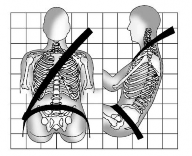< Previous | Contents | Next >
![]()
A: Airbags are supplemental systems only. They work with seat belts —
not instead of them. Whether or not an airbag is provided, all
occupants still have to buckle up to get the most protection.
Also, in nearly all states and in all Canadian provinces, the law
requires wearing seat belts.
How to Wear Seat Belts Properly
This section is only for people of adult size.
There are special things to know
about seat belts and children, and
there are different rules for smaller
children and infants. If a child will be
riding in the vehicle, see Older Children
0 96 or Infants and Young Children
0 98. Follow those rules for everyone's protection.
![]()
It is very important for all occupants to buckle up. Statistics show that
unbelted people are hurt more often
in crashes than those who are wearing seat belts.
There are important things to know about wearing a seat belt properly.

. Sit up straight and always keep your feet on the floor in front
of you.
. Always use the correct buckle for your seating position.
. Wear the lap part of the belt low and snug on the hips, just
touching the thighs. In a crash, this applies force to the strong
![]()
pelvic bones and you would be
less likely to slide under the lap belt. If you slid under it, the belt would apply force on your
abdomen. This could cause serious or even fatal injuries.
. Wear the shoulder belt over the shoulder and across the chest.
These parts of the body are best
able to take belt restraining forces.
The shoulder belt locks if there is a sudden stop or crash.

{ Warning
You can be seriously injured,
or even killed, by not wearing your seat belt properly.
. Never allow the lap or
shoulder belt to become loose or twisted.
. Never wear the shoulder belt under both arms or behind
your back.
. Never route the lap or
shoulder belt over an armrest.